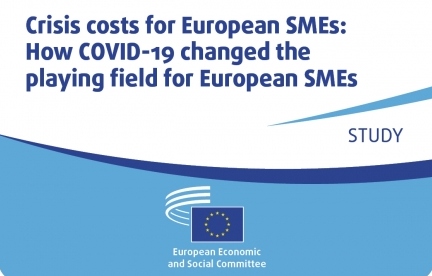The European Economic and Social Committee (EESC) study on COVID-19 crisis costs for European SMEs, underlined some of the problems small enterprises are facing to survive across the turbulences of these recent years. SMEs are the essence of the EU economy, representing the 99% of all European businesses and employing the 2/3 of the total jobs within communitarian borders.
SMEs peculiar characteristics make them more sensitive when it comes to crisis namely the covid outbreak and the Ukrainian war. The research refers to the “liability of smallness” that can be summarised as : limited resources, low resilience to overcome negative and new market conditions, lack of knowledge to access the recovery funds from Next Generation EU opportunities, management of the workforce during extreme lockdowns.
In this scenario, without any kind of public structural support, SMEs and start-ups revenues risk to drop down severely, threating lot of job positions. Speaking of sectors, Dr. Markus Jerger, Executive Director of BVMW, highlighted that the two most affected industrial sectors had been tourism and retail. However, between the two, tourism ranks within the first positions on negative economic impact classifications.
In the light of this, the EESC has defined six SMEs challenges:
1) Containment Measures: during the critique phase of pandemic they have classified enterprises according to their market response. In particular, SMEs have been defined: essential or successful business to adaptation.
2) The Workforce Challenge: it has extremely impacted several companies implying remote working adaptation and reduction in staff availability.
3) Finance Consequences: the EESC consequences underlined some of the negative finance consequences such as liquidity squeezes and additional costs to increased debt.
4) Digitalisation: digitalisation tools, representing the fourth challenge, have been crucial as a measure to interrupt infections. Although there are three levels of digitalisation, SMEs struggle to reach the advanced one. Thus, awareness and public support must be pursued to face this challenge. It is important to point out that digitalization for SMEs is not just about digital innovation, but it includes business green innovation as well.
5) Public Assistance: the study selects the mostly positive impact of the relief measures on SMEs for business survival.
6) European Diversity: the research underlines European Diversity as a way that can amplify or reduce the COVID-19 crisis. Indeed, according to Dr. Markus Jerger, regional differences in Germany have worsened the pandemic response because of different regulations and approaches.
Having said that, the document selected specific policy measures to pursue in the short and in the long term. In the short term EESC suggests to: a) simplify procedures and light administrative costs; b) sustain energy, fuel and raw materials increasing prices with direct support; c) restructure the supply chain and identify new markets. When the INSME President Mr. Sergio Arzeni interviewed Mr. Stefan Moritz, Secretary General of European Entrepreneurs CEA-PME and INSME member, he pointed out the importance of short-term measures during the COVID-19 crisis as: “Cassa Integrazione” in Italy and “Kurzarbeitergeldin” in Germany to reduce the impact of lay-offs.
While in the long term some crucial policies are needed namely: a) the involvement of SMEs in public procurement; b) better involvement of SMEs network in the decision making; c) development of training skills for workers through job seminars. The EESC study focused more on the long-term basis, stating that regulation COVID-19 interventions need to promote SMEs competitiveness and flexibility is pivotal.
INSME supported the study led by Wise Angle and SHINE 2Europe and authored by Francesco Camonita, Carina Dantas, Valentina Tageo, Alice Moreira, Alessandro Corsello and Juliana Louceiro.
Source: INSME Secretariat


